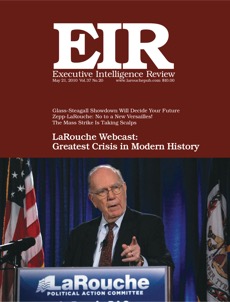LaRouche Webcast: The Greatest Crisis in Modern History
by Lyndon H. LaRouche, Jr.
In a webcast address May 8 from Northern Virginia, Lyndon LaRouche discussed first the immediate crisis the world faces, and the unique opportunity presented by the Cantwell-McCain amendment in the U.S. Senate, which calls for reinstating the Glass-Steagall law. “The people behind McCain-Cantwell and so forth,” LaRouche said, “are acting not as factitious politicians, they’re acting as patriots. And the guys who oppose them are not acting as patriots! Because, if the British system goes down, the euro system goes down—as it will go down—one way or the other, it’s doomed! This system is finished, and nobody can save it.”
The second part of his presentation was a scientific discussion of what we can (and must) do next, if we succeed in getting the Glass-Steagall amendment passed.
The transcript includes an extensive question-and-answer period.
National
Glass-Steagall Showdown Will Decide Your Future
by Jeffrey Steinberg and Nancy Spannaus
Lyndon LaRouche said on May 18 that the U.S. Senate’s passage of the Glass-Steagall separation of commercial and investment banking is an essential step toward global recovery. “If the Senate forces through the Cantwell-McCain amendment, and the President is forced to sign it into law,” he said, “despite his own desperate efforts to kill the amendment, then this will create the opportunity for several crucial European countries to break free from the total breakdown collapse they now face.”
The Implications of Glass-Steagall Today
LaRouche PAC TV interviewed LaRouche Western States spokesman Harley Schlanger.
World News
No to a New Versailles Dictatorship! The EU as a Federal State Is Unconstitutional
by Helga Zepp-LaRouche
Europe’s experiment with a currency union without political unity must be declared a failure, and the states of Europe must restore sovereign control over their own currencies and economic policy. If that is not done, tensions between the states will increase further, and hyperinflation like that of Weimar 1923 threatens to reemerge soon.
The Mass Strike Is Taking Scalps
by Harley Schlanger
The defeat of two prominent Congressional incumbents, and the decision of many more not to run again for office, demonstrates the depth of anger and political mobilization in the American electorate.
World News Briefs
Editorial
Bankrupt BP!



